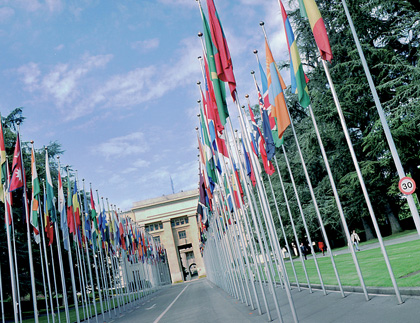An array of international organisations and advocacy groups are out there to safeguard humanitarian values, a true sign of global interdependence in the modern world. Listing all of them would take up the whole magazine issue. The most important among them are the UN, UNESCO, the International Red Cross, the World Trade Organisation, the International Monetary Fund, Interpol, ASEAN, OSCE and many more.
However, looking at the current global situation, one gets the impression that they are running empty, are ineffective or almost ineffective. Fighting terrorism is certainly an important current issue. The United States, ostensibly leading the drive, has involved all of its NATO allies, and non-NATO countries as well. They are spending billions of dollars, but the result of their furious efforts is meagre. Implacable statistics prove that the rate of terrorist attacks in the world grows with every year.
Bin Laden, the world’s number one terrorist, must be a phantom or an invisible man, as no one has been able to track him to this day. With all the sophisticated space technology they have, Americans can certainly find a pin’s head in the Hindu Kush mountains where he is said to be hiding. The United States has lost over 5,000 young men, killed in their prime, in Iraq, but terrorist attacks haven’t stopped there. Has it all been for nothing – the huge human casualties and the enormous financial costs? International analysts are warning that energy facilities will be the terrorists’ next target, especially nuclear power plants, which is a harrowing prospect. There have been subversive actions against oil facilities and oil and gas pipelines in Iraq, Turkey, India and Nigeria.
Counterfeit goods are another eloquent example of a flourishing criminal business. There are fakes of all sorts, from consumer goods to pharmaceuticals and aircraft components. Even if some efforts are being made to fight this evil, they must be both ineffective and unsuccessful, considering the following facts: In 2006, 250 million “pirate” goods were tracked and destroyed, up 350% from the 2005 level. However, experts are convinced that it is but a small part of the overall amount of counterfeit goods that escaped control and reached the market.
Drugs are another threat to mankind’s survival. Whereas 50 years ago drug addiction levels were modest in Europe and mostly seen as individual cases, the problem has since spread to all countries without exception.
They are well aware of the danger in Brussels, the seat of the EU Commission, and in Strasbourg, where the European Parliament meets, as well as in Washington, Moscow and Beijing, but they seem unable to change the situation.
Corruption is no longer a problem of individual nations, but has grown into a universal phenomenon and a global plague. A UN commission recently drew up a list of countries affected by corruption. At the top of the list are countries that have the biggest numbers of corrupt officials, and at the bottom, those where corruption is still in an embryonic state. But they couldn’t find a single corruption-free country.
It boggles themind thatmaritime piracy is back and growing despite advanced communications technologies and space-age military equipment. The problem is becoming worse than in the Middle Ages. Pirates reign on the seas; they can capture any ship and demand a ransom of any size, and get off with it easily.
Important speakers spout indignation from their high rostrums, while pirates operate freely, ignoring the speakers’ empty threats. Why is it happening? The international community also seems inexplicably inert and impotent against financial scheming on a global scale. There has beenmuch talk lately about the international financial system being outdated and irrelevant in its current form, and that it needs to be modernised.
Effective measures need to be developed next year to put an end to the international community’s impotence, and to ensure mankind’s security in all its vital functions.













